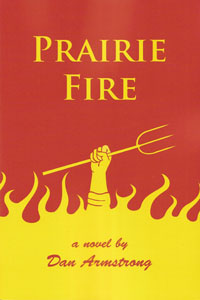Oil, Food, and the Coming Crisis in Agriculture
"Without your support I would have given up on this long ago. And without your positive input, I would have drowned in pessimism."
The lines quoted above were written by Dale Allen Pfeiffer to his wife in the dedication to his book Eating Fossil Fuels. What does it mean when an author begins a work with an allusion to his "drowning in pessimism" and ends with a chapter entitled "Twelve Fun Activities for Activists"? With Dale Allen Pfeifer, it must be an insight into how gravely he views his subject and how hard he has worked to gain any kind of positive perspective on it. What his book describes regarding world food production is as sobering as the darkest side of global warming. It warrants this kind of grim concern.
Eating Fossil Fuels begins and ends with a very basic assessment, something that too few people completely understand or think about, and yet is absolutely critical to our well-being on planet Earth: our food supply is highly dependent on hydrocarbons, whether as fossil fuel or petrochemical additives. In the 1950s and 1960s when population growth threatened to outrun food stores, an international agricultural program, now referred to as the Green Revolution, was initiated to increase farm production all around the world through the intensified use of petrochemical fertilizers and irrigation. The results were impressive. Production nearly tripled. In the years since, low cost fossil fuels have increasingly become a critical part of all facets of industrial agriculture from the growing to the packaging to the transportation to the preparation of the product, to the extent, as Mr. Pfeiffer would say, we are all but eating fossil fuel.
Unfortunately, this kind of petrochemical farming has proven unsustainable as a long term strategy. It depletes the natural life of the topsoil, compromises the water supply, and with peak oil on the horizon, will soon be too expensive to maintain. Pfeiffer makes it very clear that if we don't change the way we grow food, peak oil will do more than increase the price of gasoline. It will take food off the table of significant portions of the world. Clearly his own deep concerns for the situation are at least part of the reason for the pessimism we should all be glad he overcame. His book is an important one.
Pfeiffer is a geologist and a scientist as well a writer. In the process of making his argument, he lays a lot of numbers on the reader. Statistics can make slow reading, but in this case they are critical to the material. Any real analysis of our environment must include numbers. Stewarding the planet is an engineering task. Maximize this, minimize that. How to best make use of the resources at hand is a numbers game. Eating Fossil Fuels is not a novel; it's a technical book. You have to stop and think when you read it.
Pfeiffer has long written on the subject of Peak Oil. To be sure, his work awakened quite a few of us to the realities of petroleum depletion. The idea that an economic recession would accompany the back end of the bell curve of petroleum production is widely held. A related agricultural crisis and population die-off are also part of the scenario. This is what Pfeifer is trying to prepare us for. To elucidate what we will have to know and do, he uses the nations of North Korea and Cuba as examples of countries that have already had to face severe cuts in their fuel supply. This analysis is some of the most unique and provocative material in the book.
The industrialization of North Korea was enabled by its relationship with the two giant communist powers, China and the Soviet Union. In particular, large amounts of North Korea's oil and natural gas came from the Soviet Union through trade. Like other nations during the Green Revolution, North Korea relied on petrochemical fertilizers and irrigation to increase its food production in step with its growing population. Since the collapse of the Soviet Union at the beginning of the 1990s, however, due to financial difficulties and its renegade politics, North Korea has experienced a precipitous drop in oil and natural gas availability and currently exists on less than half what it did in the 1980s. As a result North Korea now relies heavily on coal to produce energy and facilitate food production and distribution. Unfortunately coal is considerably less efficient than either oil or natural gas for just about any task. It also can not fulfill North Korea's energy needs. The results have been obvious. Over the last 15 years, we have watched a steady economic and agricultural collapse in North Korea. Energy for agricultural machinery, electricity for irrigation pumps, natural gas additives for fertilizer, and fuel for transportation are just not adequately available any more in North Korea. There has been a substantial population recession associated with related food shortages and infrastructure decline. North Korea has become a nation reduced to bargaining for energy with nuclear threats.

